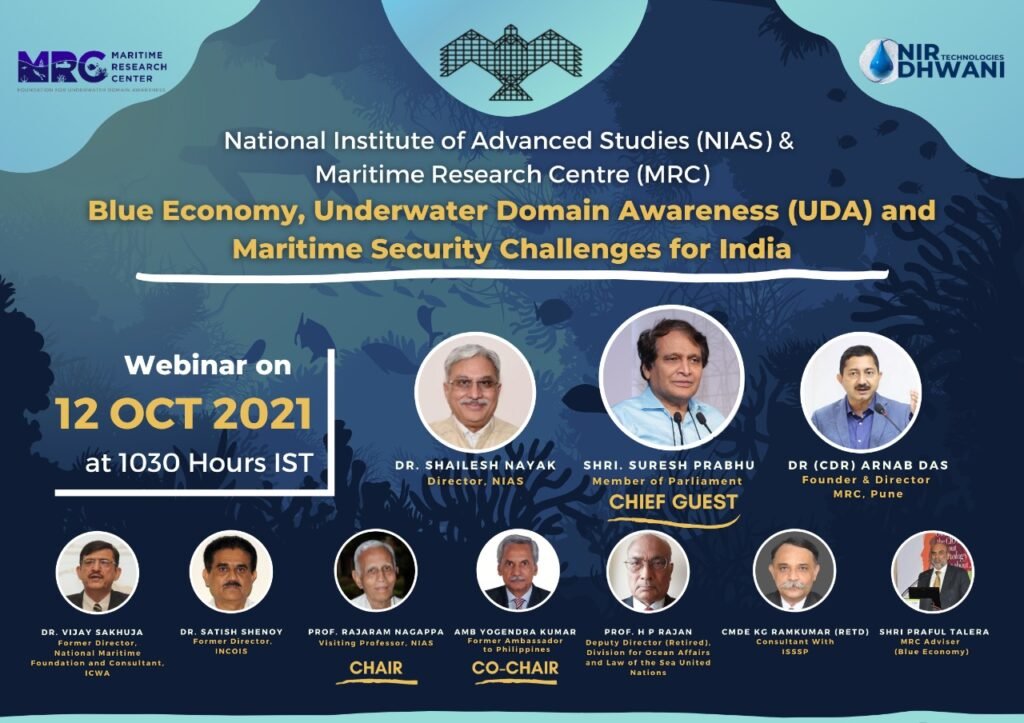The concept blue economy has emerged as a commonly accepted development pattern, has been used in different ways across the globe. The concept gained attention when United Nations’ Sustainable Development Goal 14 sought to “conserve and sustainably use the world’s ocean, seas and marine resources” for the sustainable development as the guiding principle of ocean governance. The World Bank also understand the critical importance of ocean health has defined the concept as a means to “promote economic growth, social inclusion, and the preservation or improvement of livelihoods while at the same time ensuring environmental sustainability of the oceans and coastal areas.” Since, some state activities are depend upon the status of the underlying ecological systems. Therefore it is important to note that the potential degrade of marine ecology would invariably affect the jobs and economic growth in this segment of the global economy. India has fully realised the potential of ocean economy and need for sustainable development of the costal and ecological system have identified key areas in the draft India’s Blue Economy Policy which aimed to accelerate employment and growth, while safeguarding the environment and in harmony with the UN Sustainable Development Goals.
India’s “Vision of New India by 2030” highlights the Blue Economy as one of the ten dimensions of growth. The biological resources, ocean energy, extraction of ocean mineral resources and developing coastal tourism are the top of the list in the Indian blue economy policy and much sought out by the policymakers to double the growth. India has already signed two agreement with the International Seabed Authority (ISBA) for exploration of Polymetallic Nodules and Hydrothermal Sulphide in the Indian Ocean. Each is rich in manganese, nickel, cobalt, and cooper, some of the minerals are key ingredients for making electric cars, solar panels and other modern electronic gadgets. The deep-sea mining of resources holds important position in transforming the Indian manufacturing sectors. India also has exclusive rights over living and non-living resources in the 2.37 million sq. km of its Exclusive Economic Zone (EEZ) and also committed to explore its EEZ by 2023. Under the United Nation Convention of Law of the Sea (UNCLOS) India’s rights on the continent shelf can be extended up to 350 nautical miles. Of this, the first partial claim of about 0.6 million sq.km is already submitted to the Commission of Legal Continental Shelf (CLCS) and the second claim of 0.6 million sq.km is yet to be submitted.[1] In this case India’s right on the seabed will increase from present 2 million to 3.2 million sq.km in the near future.[2] If UNCLOS ratifies claims then India can explore the area and exploit oil, natural gas and mineral resources in the extended area too. This will call for constantly monitoring and assessing the condition of the oceans and ocean’s resources and evolving/applying best practices for marine management. An understanding of parameters impacting the processes and resources on and below the ocean surface are needed for effective management and stewardship of the oceans resources.
For sustainable utilization of resources in the Indian Ocean, India need to develop ocean related capabilities, technologies and skillsets. At the same time, the situational awareness has become an increasingly a prominent component of the Blue Economy where the state wants to have comprehensive knowledge of the situation at, or related to the seas. This is has led to the Maritime Domain Awareness (MDA) and the subset UDA. UDA can be a useful system both to monitor the subsurface threat as well as marine life, undersea environments, monitor, assess the geophysics, anthological activities, biological health environment of the Ocean. The subsurface threats in the Indian Ocean is increasing in the last few years my pose threat to India’s economic security in the EEZs. Therefore, it is important to assess, how critical are these threats to India?
Against this background, NIAS – MRC, Pune proposes to organise webinar on the Blue Economy, Underwater Domain Awareness (UDA) and Maritime Security Challenges for India. The seminar is an attempt to bring together experts and scholars in the field of maritime affairs to discuss various facets of Blue Economy and UDA
Downloads



Leave a Reply